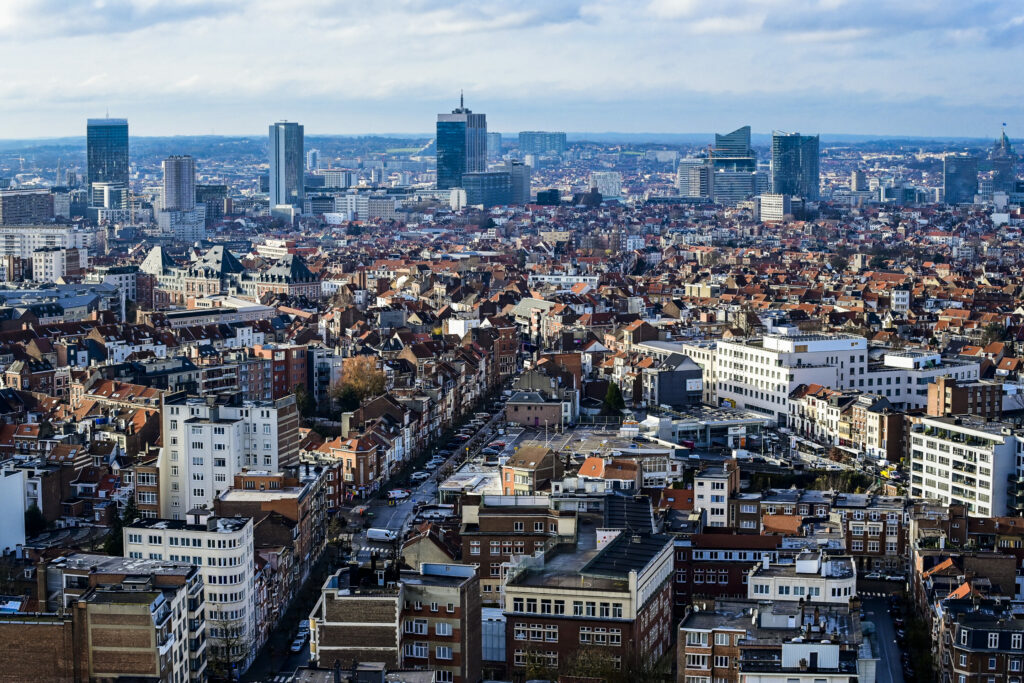While average house prices in Belgium rose in the first three months of 2025, sales grew by almost 16% compared to last year, according to the latest Real Estate Barometer of the Federation of Notaries (Fednot).
Nationally, there was a 15.7% increase in property sales compared to the first quarter of 2024. The number of real estate transactions rose by 19.1% in Flanders, and 12.5% in Wallonia. For the Brussels-Capital Region, the increase was limited to 1.2%.
"The real estate market was a lot busier, especially in January. We were expecting an increase, but we were not expecting it to be so high," notary Bart van Opstal, spokesperson for the Fednot federation of Belgian notaries, told The Brussels Times.
This certainly has to do with the new reduced registration tax in both Flanders and Wallonia, meaning buyers could save thousands of euros if they waited until 2025 to sign their contracts.

A 'For Sale' sign during a house move in Brussels. Credit: Belga / Laurie Dieffembacq
"On top of that, interest rates were incredibly low in the first quarter of this year," van Opstal said. "In other words: buying property was not only cheaper in terms of registration fees, but also in terms of getting a mortgage loan at the bank."
These factors play a very important role in the decision pattern of whether or not people buy a home, but also in their timing. "This explains why January in particular saw a huge peak. But by March, that peak had almost disappeared because interest rates had already risen again."
The highest increase in Flanders was recorded in the province of West Flanders, which saw over one-fifth more sales (22.88%), followed by the province of Flemish Brabant (around the Brussels-Capital Region) with 21.24%.
For Wallonia, sales rose massively in the provinces of Walloon Brabant (24.51%) and Namur (21.48%). However, Liège province saw a much smaller rise (8.42%) and the province Luxembourg even saw a drop (-3.24%).
What about Brussels?
Meanwhile, Brussels registered an increase of 1.2%, but it did not see a similar peak in house purchases at all.
"The fact that Flanders and Wallonia decided to reduce the registration fees at the same time is a coincidence, because the regional governments can autonomously decide what these rates should be and when to implement them," said van Opstal.
Brussels, however, did not make a similar decision, meaning there was no incentive effect of advantageous fiscal measures for buyers.

A logo of the National Bank of Belgium. Credit: Belga / Jonas Roosens
Van Opstal noted that deciding to reduce these registration fees – even if it is only a 1% reduction like in Flanders – has important budgetary implications. "Regions have to see whether they can achieve this or not."
Brussels' budget deficit now totals nearly €15 billion, with no government agreement in sight. Meanwhile, Flanders' budget is balanced. "This means that Flanders has much more budgetary leeway for such a measure than Brussels. And the outgoing Brussels Government is not authorised to make any new budgetary decisions, which also plays a role."
Average house prices in Belgium
In the first quarter of 2025, a house in Belgium cost an average of €355,371 – a 7.8% increase compared to the annual average of 2024. In Flanders, the average price of a house rose to €379,737 (+3.3%). In Brussels, the price rose to €589,280 (+3.4%).
In Wallonia, the price of a house ended at €281,069, a price increase of no less than 17.8%. "This is potentially a temporary phenomenon, because quite a few buyers waited for the reduction in registration tax at the beginning of this year to close the deal."

